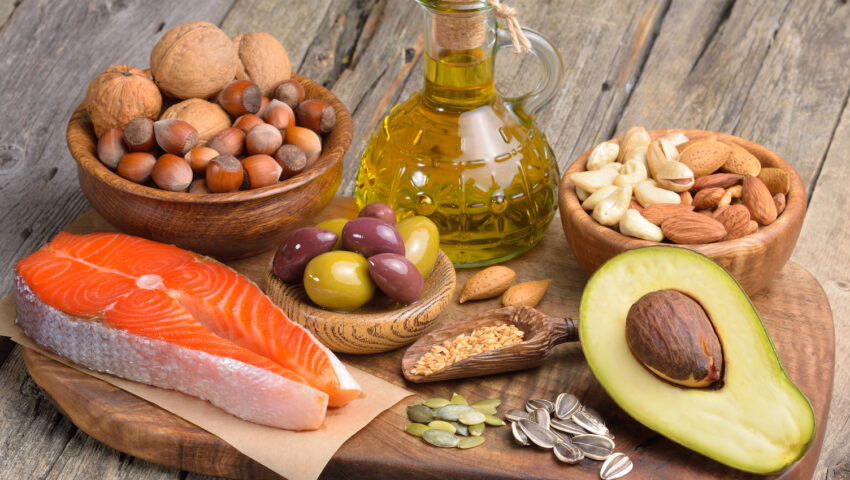Blogs
What are Healthy Fats

Dietary fat usually gets a bad rep, however, fat is an important part of a healthy and balanced diet. In this blog, we discuss what are healthy fats and how we can incorporate them into our diets.
What do we mean by “healthy fats.”
These are unsaturated fats that can provide a variety of health benefits when consumed in moderation. Examples of healthy fats include:
- Monounsaturated fats are found in olive oil, avocado, and nuts.
- Polyunsaturated fats are found in oily fish, flaxseeds, and vegetable oils.
Whereas, saturated fats have detrimental effects on our health such as the increased risk of heart disease and high cholesterol. Saturated fats are found in butter, lard, ghee, processed/ fatty meat, cheese, biscuits, cakes, and all the other tasty treats that we secretly love.
Why are healthy fats important?
Healthy fats (unsaturated fat) play a crucial role in brain function and can help to improve cognitive performance and memory. They also help to reduce inflammation in the body, which can lower the risk of chronic diseases such as heart disease and diabetes. As well as the following:
- Keeping our bodies insulated so we stay warm.
- Provide us with energy
- Production of hormones.
- Help us feel fuller for longer.
- Help to improve the absorption of fat-soluble vitamins and minerals, such as vitamins A, D, E, and K.
UK recommendations:
|
|
Dietary recommendation |
The current daily average intake in UK adults |
| Total dietary fat | No more than 35% of total energy | 34.4% men
35% women |
| Saturated Fat | No more than 11% of total energy | 12.3% men
12.7% women |
Tips for incorporating healthy fats into our diets
- Use healthy (unsaturated) fats as a replacement for unhealthy, saturated fats in your cooking.
- For example, instead of using butter or lard, try using vegetable, olive, rapeseed, or avocado oil when sautéing or roasting vegetables.
- Review the cooking methods you use- Swap frying for grilling, steaming, or baking foods instead.
- Add nuts or seeds to your meals and snacks for a boost of healthy fats- One great way I like to do this is by adding nuts and seeds on top of my porridge or yoghurts. Aim for 30g as a portion size as even though these are very nutritious, they are also high in energy.
- Incorporate oily fish into your diet, such as salmon, mackerel, trout, tuna, or sardines, which are rich in omega-3 fatty acids.
Omega 3 fatty acids have been shown to have numerous health benefits, including reducing inflammation and improving heart and brain health. Aim to try and include one serving of oily fish in your diet once a week! Don’t worry, for those who do not eat fish, you can also get Omega 3 from plant sources such as walnuts, chia seeds, or flaxseeds.
- Replace processed and high-fat meats with lean poultry or plant-based proteins (beans, peas, or lentils), these will help you meet your protein requirements whilst reducing the saturated fat you consume. Plant-based proteins are particularly great as they add extra fibre to your meals- keeping you fuller for longer and less likely to snack on unhealthy foods!
- Watch out for salad dressings, especially when dining out these can be high in saturated fats and sugar. Give it a go and create your own using olive, flaxseed, or rapeseed oil.
Monthly Challenge:
Try to add a serving of oily fish to your diet at least once a week, or switch up your cooking methods by grilling, steaming, or baking your food instead of frying.
It’s important to note that while healthy fats are an important part of a balanced diet, they should still be consumed in moderation. Aim to include a variety of healthy fats in your meals and snacks and be sure to pay attention to portion sizes.
Further reading recommendations
https://www.nutrition.org.uk/healthy-sustainable-diets/fat/?level=Consumer
https://www.bhf.org.uk/informationsupport/support/healthy-living/healthy-eating/fats-explained
https://www.nhs.uk/live-well/eat-well/food-types/different-fats-nutrition/





